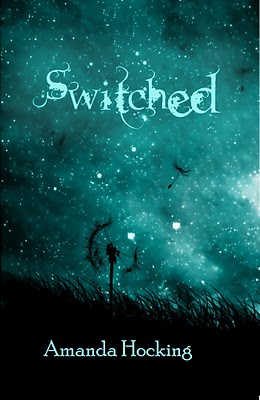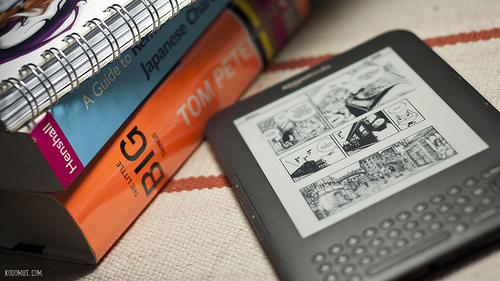 If you pay much attention to eBook success stories, you’ve probably heard of Amanda Hocking, who began self-publishing her young adult contemporary dark fantasy/romance novels for the Kindle about a year ago and has since made more than two million dollars from them. The burning questions this brings up are: Why her? What has she done right? and Can other writers somehow follow in her footsteps?
If you pay much attention to eBook success stories, you’ve probably heard of Amanda Hocking, who began self-publishing her young adult contemporary dark fantasy/romance novels for the Kindle about a year ago and has since made more than two million dollars from them. The burning questions this brings up are: Why her? What has she done right? and Can other writers somehow follow in her footsteps?
I’m only an interested observer, but I have a few thoughts I hope you may find useful based on digging up industry statistics, learning what Ms. Hocking has had to say about her own work, and reading the beginning of her Trylle Trilogy.
Feeding a need
The heart of the matter, if you ask me, is that Ms. Hocking is successfully providing something that a huge number of readers want. Her Trylle books feature a slightly misanthropic, beautiful teenage girl who discovers she is a troll changeling princess when she returns to the troll enclave where she was born. The premise has some obvious similarities to Stephanie Meyer’s Twilight books, which are about a disgruntled, beautiful teenage girl who discovers she has unusual status among a small, benign group of vampires. Both series feature a tension between the paranormal world and the normal world, multiple potential boyfriends, family conflicts, life-or-death obstacles to love, paranormal creatures who are more beautiful than ordinary humans, and dramatic, no-holds-barred romances that become literally more important than life to the main characters.
At the same time, Hocking doesn’t seem to have just traced Meyer’s books and filled in the outlines with her own ideas: the Trylle Trilogy seems very much the same kind of thing as Twilight, et al, without being a revamp. Hocking’s plots and premise have enough of her own invention to set them apart from Meyer’s work while still appealing strongly to the same kinds of readers. I think Hocking benefits enormously from Twilight’s audience being a large, book-hungry, self-aware group. Now that they’ve read Meyer’s books, they know what they want and are looking for more of it. Hocking appears to be deeply in tune with these readers and to intuitively want to deliver the right mix of danger, romance, strangeness, and angst. Anyway, that’s my theory.
Mistakes that don’t matter?
What’s very interesting to me, too, is what Hocking doesn’t do well. Her grammar is not great. She uses “alright”–a colloquialism that nearly any editor in New York would rapidly correct to “all right”–in narration, along with many other similarly dubious constructions. There are places in her books where a key word or phrase has accidentally been left out. She makes a huge number of small-scale writerly “infelicities,” and there are very often several grammatical and writerly issues on a single page.
In other words, she sorely needs a copy editor–or at least, that was my reaction when I saw her work. But apparently more than a million readers don’t necessarily agree, because poor copyediting has not gotten in the way of her tremendous success. What surprises me is that after she started bringing in all that money–and presumably started hearing about errors in the books–she wasn’t interested in engaging a copyeditor to spend a little time cleaning them up. With eBooks, cleaning up the current edition is simply a matter of doing the edits and uploading them. Admittedly, Hocking must have a lot going on at this point–for instance, a new, 2 million dollar, 4-book deal with St. Martin’s Press–but would this have been so hard?
Then again, a lot of major publishing houses put out eBooks plagued with formatting problems. I guess this is what happens in the Wild West phase of a new business environment.
But in a way I’m grateful she hasn’t done this cleanup work, because it demonstrates something very basic and very important about writing: it’s about delivering a story people care about, and if it does that, it can succeed regardless of trappings, presentation, or the opinions of pundits. It doesn’t matter what people who don’t buy her books think about them if she has a large enough audience of people who do buy her books, and it doesn’t matter much if the people who do buy her books notice errors if they still enjoy the story.
Books for teenage girls that aren’t for teenage girls
 One more surprising thing about Hocking’s success is that it’s happening on the Kindle. The reason I say that this is surprising is that the official target market of her books seems to be teenaged girls, yet according to a recent Nielsen poll, only 12% of Kindle users are under the age of 18, and users are about equally balanced between males and females. Were the majority of those one million plus book sales to the 6% of Kindle readers who are female and under age 18? Probably not. Harry Potter and the Twilight series had huge adult audiences, and the people reading about teenage paranormal romance in this case seem to be mainly adults, and presumably mostly female. This begins to shed more light on both Hocking’s and Meyer’s success, because to the best of my knowledge, English-speaking, adult, female romance fans are the most prolific readers on the planet. It’s a damn nice audience if you have the kind of imagination that naturally taps into it.
One more surprising thing about Hocking’s success is that it’s happening on the Kindle. The reason I say that this is surprising is that the official target market of her books seems to be teenaged girls, yet according to a recent Nielsen poll, only 12% of Kindle users are under the age of 18, and users are about equally balanced between males and females. Were the majority of those one million plus book sales to the 6% of Kindle readers who are female and under age 18? Probably not. Harry Potter and the Twilight series had huge adult audiences, and the people reading about teenage paranormal romance in this case seem to be mainly adults, and presumably mostly female. This begins to shed more light on both Hocking’s and Meyer’s success, because to the best of my knowledge, English-speaking, adult, female romance fans are the most prolific readers on the planet. It’s a damn nice audience if you have the kind of imagination that naturally taps into it.
So what can we other writers learn from Hocking if we want to see success in finding an eBook audience? Well, a few things come to mind: Find your natural demographic. Write a lot. Get your work out there. Work tirelessly. Make your story yours even if it taps into an existing readership. Worry more about connecting with a good story than about publishing method, presentation, or promotion.
For what it’s worth, the authors I know personally who have done fairly well with eBook novel sales are also people who seem to be following these kinds of approaches, except that in the cases I’ve seen they are much more polished in their presentation than is Hocking.
That’s about it for light I can shed on the subject at the moment, but there’s probably much more we can learn from Hocking, and links to posts that delve into that would be welcome in comments.




